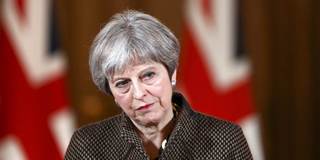With economic conditions returning more or less to normal around the world after a decade of financial crises, nationalist populism is now seen as the biggest threat to global recovery. But is it possible that this consensus has emerged just as the populist wave has crested?
NEW YORK – With economic conditions returning more or less to normal around the world after a decade of financial crises, nationalist populism is now seen as the biggest threat to global recovery. That was certainly true of the finance ministers who gathered in Washington, DC, this month for the IMF’s annual spring meeting. But is it possible that this consensus has emerged just as the populist wave has crested? Rather than populist politics undermining economic recovery, could economic recovery be undermining populist politics?

NEW YORK – With economic conditions returning more or less to normal around the world after a decade of financial crises, nationalist populism is now seen as the biggest threat to global recovery. That was certainly true of the finance ministers who gathered in Washington, DC, this month for the IMF’s annual spring meeting. But is it possible that this consensus has emerged just as the populist wave has crested? Rather than populist politics undermining economic recovery, could economic recovery be undermining populist politics?